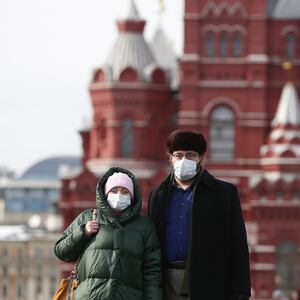The Lancet, a top scientific journal, has pulled a major paper questioning the effectiveness of the malaria drugs chloroquine and hydroxychloroquine in the treatment of COVID-19.
The Thursday reversal came after the three authors of the May 22 paper—Mandeep Mehra, Frank Ruschitzka, and Amit Pate—disavowed their own work.
Their paper, entitled “Hydroxychloroquine or chloroquine with or without a macrolide for treatment of COVID-19: a multinational registry analysis,” found no clear benefit of treating coronavirus patients with chloroquine and hydroxychloroquine.
The malaria drugs have become objects of intense scrutiny after President Donald Trump touted them as effective COVID-19 treatments and even claimed, without offering evidence, that he was taking hydroxychloroquine as a preventative.
The Lancet retraction does not mean chloroquine and hydroxychloroquine are more effective than other researchers have claimed. Multiple studies have cast doubt on chloroquine and hydroxychloroquine as effective COVID-19 treatments.
The New England Journal of Medicine on Wednesday published a study of more than 800 COVID-19 patients who received the malaria drugs. “Hydroxychloroquine did not prevent illness compatible with COVID-19 or confirmed infection when used as postexposure prophylaxis,” the study found.
In a statement, Mehra, Ruschitzka, and Pate explained that their fourth collaborator, Sapan Desai, refused to give peer-reviewers access to the full database underpinning the study. Surgisphere Corporation, the Illinois-based research company that Desai founded, contributed raw data that the four-person research team used to assess chloroquine and hydroxychloroquine.
“Several concerns were raised with respect to the veracity of the data and analyses,” Mehra, Ruschitzka, and Pate wrote in their retraction.
“We launched an independent third-party peer review of Surgisphere with the consent of Sapan Desai to evaluate the origination of the database elements, to confirm the completeness of the database, and to replicate the analyses presented in the paper,” the three scientists continued.
“Our independent peer reviewers informed us that Surgisphere would not transfer the full dataset, client contracts and the full [International Organization for Standardization] audit report to their servers for analysis as such transfer would violate client agreements and confidentiality requirements. As such, our reviewers were not able to conduct an independent and private peer review and therefore notified us of their withdrawal from the peer-review process.”
“My research intentions have always been to contribute to scientific discussion and to ensure that the practice of medicine is based on the best evidence available,” Mehra told The Daily Beast separately. “During this pandemic, I have felt this even more keenly, and believe that it is imperative to provide timely data that informs both the scientific field and the care of our patients.”
Surgisphere defended the study. “In our hydroxychloroquine analysis, we studied a very specific group of hospitalized patients with COVID-19 and have clearly stated that the results of our analyses should not be over-interpreted to those that have yet to develop such disease or those that have not been hospitalized,” the company stated.
“We also clearly outlined the limitations of an observational study that cannot fully control for unobservable confounding measures, and we concluded that off-label use of the drug regimens outside of the context of a clinical trial should not be recommended.”
The back-and-forth over The Lancet study does not seem likely to change physicians’ feelings toward the malaria drugs.
“Hydroxychloroquine and chloroquine are increasing issues with arrhythmias and have yet to prove much benefit for treating COVID-19,” Edwin Hayes, an infectious-disease doctor with the Prisma Health Hospital system in Columbia, South Carolina, told The Daily Beast. “Based on the data from studies so far, it appears the risks are outweighing the benefits, and other treatments being investigated are garnering more interest.”
“There is still so much we have to learn about how to manage these patients safely and effectively,” Hayes added. “’Do no harm’ has remained an important guiding principle in these challenging times.”
In their retraction, Mehra, Ruschitzka, and Pate expressed their regret for any confusion their retraction might cause. “We all entered this collaboration to contribute in good faith and at a time of great need during the COVID-19 pandemic,” they wrote. “We deeply apologise to you the editors and the journal readership for any embarrassment or inconvenience that this may have caused.”





